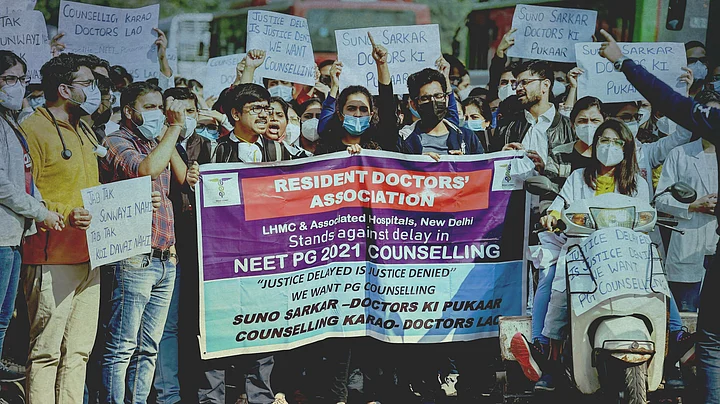Pronouncing its order in the NEET PG counselling case, the Supreme Court on Friday, 7 January, upheld the existing criteria that provides for 27 percent reservation for Other Backward Class (OBC) and 10 percent reservation for Economically Weaker Section (EWS) category in the All-India Quota (AIQ) seats for medical courses for this year.
For the EWS category, the existing criterion of Rs 8 lakh annual income has been upheld for this academic year.
The Supreme Court has listed petitions challenging Rs 8 lakh income criteria for EWS on 5 March for final adjudication.
"In EWS, we've upheld the criteria for this year so that the admissions are not dislocated for the current academic year. We will hear the petition with respect to the EWS criteria later," the bench comprising of Justices DY Chandrachud and AS Bopanna was quoted as saying by LiveLaw.
"We are in a situation, where in the national interest, the counselling has to begin," the Supreme Court has said on Thursday.
What Was the Case?
The Supreme Court on 25 October had told the Centre to put on hold counselling for NEET-PG until it decides the validity of Other Backward Class and Economically Weaker Section reservation in All India Quota.
The apex court had questioned the Centre on the rationale behind adopting the criteria of the OBC creamy layer of Rs 8 lakh annual income for granting reservations under the EWS, despite the latter not suffering from social and educational backwardness.
The Centre on 31 December had informed the Supreme Court that it has decided to accept the recommendation of a panel to retain the existing criteria of Rs 8-lakh ceiling for the EWS reservations for medical courses in India.
In the affidavit filed before the court on 31 December, the Centre said a three-member expert panel has recommended that only those families whose current gross annual income is up to Rs 8 lakh should avail benefit of EWS reservation.
The expert committee has said that changing the EWS criteria midway through the admission process will lead to complications, and advised that the revised criteria be introduced from next year.
"It is completely unadvisable and impractical to apply the new criteria (which are being recommended in this report) and change the goal post in the midst of the ongoing processes resulting in inevitable delay and avoidable complications. When the existing system is ongoing since 2019, no serious prejudice would be caused if it continues for this year as well," the expert committee had recommended.
As the counselling process had remained suspended, resident doctors across the nation had protested against the delay in the induction of new members into the medical workforce.
(With inputs from LiveLaw)
